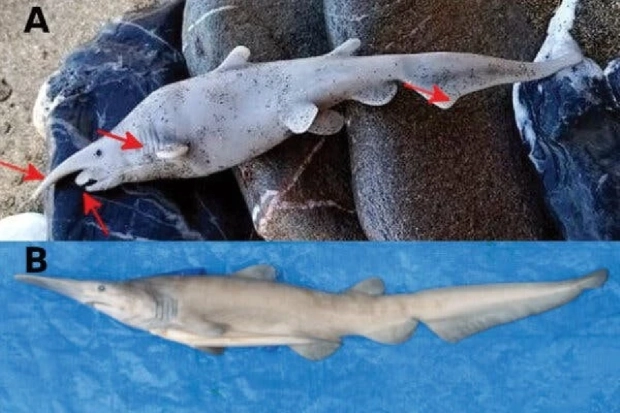Goblin sharks are elusive deep-sea fish typically found in the Mediterranean ocean.
A group of scientists found what they said was a goblin shark that had washed ashore on a Greek beach, which had been announced in the journal Mediterranean Marine Science last year.
According to the scientific paper, the goblin shark was discovered by Giannis Papadakis in August 2020, who had led the shark on a rock and snapped a picture of it.
The paper was seen as a great example of citizens without a formal scientific background helping out professional scientists in research.
But eventually, shark experts worldwide started to doubt the goblin shark's authenticity.
Experts then tabled a critique of the paper, to which the original authors hit back with their justifications.
“It didn’t look right,” David Ebert, author of the book 'Sharks of the World', told the New York Times.
“It’s too small, and its gills don’t look like they’re actually open,” he said, adding that “It doesn’t look natural at all.”
Ebert and others were cautious because there had been no direct examination of the shark by someone with a formal science background.
The paper was reportedly based solely on a photo and a brief description by Papadakis.
Experts have said the specimen’s lack of teeth, overly rounded fins, and the low number of gill slits didn't fit the characteristics of a goblin shark.
A photo of a plastic goblin shark toy sold by an Italian toy company, DeAgostini, was found online.
Experts argue it looks suspiciously similar to the goblin shark found in Greece.
The toy “shows a great similarity to the specimen in the published image,” Jürgen Pollerspöck, an independent shark researcher and a co-author of the report doubting the Greek goblin shark’s authenticity, told the New York Times.
The original paper's authors then retracted it, as well as their reply to the critique.
Whether or not the shark is legitimate, critics have blamed the peer review process instead of the scientists and citizens who helped born the paper.
“In my opinion, the problem and responsibility lie with the editor of the journal and the reviewers,” Mr Pollerspöck said.


